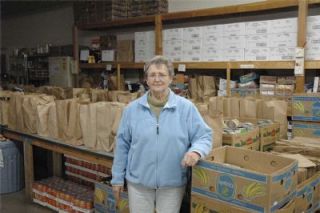MARYSVILLE In 2007, the Marysville Community Food Bank served 11,988 households containing some 39,000 individuals.
Those people in need received roughly 350,800 meals equaling 440,000 pounds, or 220 tons, of food distributed by volunteers who racked up more than 14,500 hours of service.
Of course, the program didnt start out with those kinds of numbers. What it did start out with was former director JoAnn Mulligan, a neighbor and the trunks of their cars.
For growing the food bank from those humble beginnings, Mulligan recently was named a 2008 Jefferson Award winner at a banquet March 25. She is one of five recipients from among over 100 nominees and, with the other winners, is under consideration for a national Jefferson Award possibly given sometime this month.
Its a great honor, but its humbling, said Mulligan, 73. I feel like I havent done that much and Ive had plenty of volunteers that have helped.
With no trace of bragging in her voice, Mulligan matter-of-factly and clearly tells the history of the organization she founded. That history started in 1977 at St. Marys Catholic Church on 88th Street in Marysville.
The church would get calls from people, people that were hungry, wondering if we could assist them, Mulligan said. We started out, in a sense, not really knowing what we were doing.
She and the above mentioned neighbor would deliver food to maybe two dozen families from the trunks of their cars. Having arrived at the church with food bank experience from previous assignments, a new priest at St. Marys took what Mulligan called a special interest in her fledgling charity. The project was moved from the trunks of those two cars to the church rectory. The numbers of families served continued to grow steadily.
Sometime in the early 1980s, Mulligan and St. Marys started getting help from the Volunteers of America in Everett. Eventually, the VOA asked Mulligans group to become the official base for a local food bank. The program became a conglomeration of the efforts of over a dozen local churches. Their first home was a small space off an alley on Fifth Street, Mulligan said, where the organization served between 60 and 70 families a week.
It just kept growing from there, she added.
By 1985, Mulligan had organized the Marysville Food Bank into a certified non-profit organization. In 1997, a federal grant helped build the current food bank building on 60th Drive NE.
It was a major step, a major change, Mulligan said about giving the Food Bank its own home. The organization owns the building, but rents the land from the adjacent Marysville YMCA for $1 a year.
In the next few years, as it turns out, the whole program will be going full circle, at least in terms of location. The YMCA wants to use the space occupied by the food bank, which has in turn gone looking for another home.
After scouting a number of locations, Mulligan said she and other food bank leaders decided on a spot behind St. Marys Church. Donations and grants will be needed to make the move happen.
While a son still serves on the board of directors, Mulligan formally stepped down as director of the Marysville Food Bank in January. She still does some volunteer work. Not incidentally, Mulligan started out as a nurse, earning her degree from the University of Washington. Despite never earning a paycheck for her work with the food bank, Mulligan gave up her career in 1976.
I was busy here, she said. Again without a hint of bragging, Mulligan professes to a genuine concern for people.
I suppose that goes back to the nursing, she said.
Mulligan does notice some differences between the food banks current clientele and the people she helped from the trunk of her car all those years ago. For one thing, she said there are a lot more senior citizens looking for help. There are still plenty of families.
These people are working, but they are the working poor, Mulligan said. A lot of our people feel they are losers, but they are not. They just need more help than most.
Former food bank director earns award
MARYSVILLE In 2007, the Marysville Community Food Bank served 11,988 households containing some 39,000 individuals.



